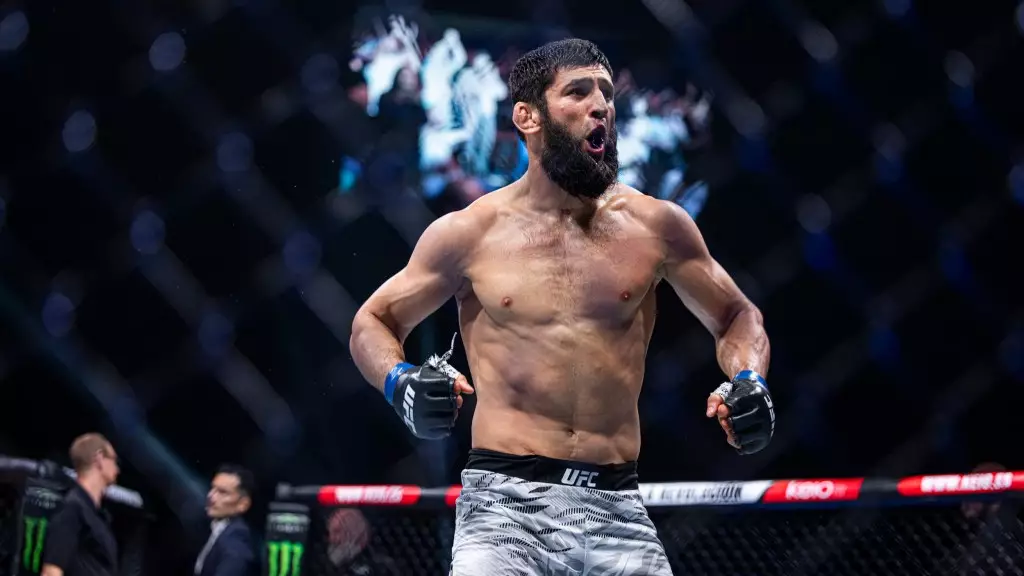The world of mixed martial arts is ever-evolving, and the recent showdown at UFC 308 has sparked intense discussions surrounding the middleweight division. Daniel Cormier, a renowned fighter turned commentator, feels that Khamzat Chimaev has firmly placed himself ahead of Sean Strickland for the title shot, following an explosive first-round submission victory over former champion Robert Whittaker. This striking development not only alters the trajectory of the title picture but also raises questions regarding the future of Strickland and the implications for the middleweight division as a whole.
Khamzat Chimaev’s record of 14-0 in mixed martial arts and 8-0 in the UFC speaks volumes, but it was his decisive victory against Whittaker that catapulted him into title contention. Chimaev’s ability to dominate an elite fighter like Whittaker within moments of the match started reverberating throughout the sport. Cormier stated that Chimaev’s performance was not just impressive; it redefined expectations for contenders in the middleweight division.
Chimaev’s approach to the fight—initiating with a double leg takedown, securing a rear-naked choke, and managing to inflict damage—demonstrated both technical prowess and ferocity. The mention of breaking Whittaker’s jaw in the process adds an unsettling layer of dominance to the narrative. Whittaker, often regarded as one of the top fighters in the world, had long been a hurdle for many contenders, making Chimaev’s victory not only a personal achievement but a statement to the entire division.
In stark contrast to Chimaev’s rapid ascent, Sean Strickland finds himself in a precarious situation. Following a split-decision loss to Dricus Du Plessis earlier this year, Strickland had been positioning himself for another shot at the title. His unanimous decision victory over Paulo Costa provided him with much-needed momentum, bolstering his claim as the number one contender. Yet, the shadow of Chimaev’s performance now looms large.
Strickland has remained vocal about his entitlement to the next title shot, asserting, “I am next in line… it’s been said, it’s been written.” However, Cormier’s analysis highlights how unpredictable the landscape has become, especially with promotions potentially gearing up for Chimaev’s spectacular run. The contrast between confidence and uncertainty is palpable as Strickland is left contemplating the serious ramifications of the UFC’s shifting attention toward Chimaev.
The fallout from UFC 308 raises numerous questions regarding the direction the middleweight division will take. Cormier suggests that Chimaev has indeed carved out a position as the number one contender. Yet, the implications extend beyond two fighters; they may alter the dynamics at play within the entire division. Chimaev’s prowess not only solidifies him as a prominent figure but also poses a challenge to existing contenders who have traditionally held the spotlight, effectively reshuffling the hierarchy.
Moreover, with championship aspirations at stake, the push for changes in matchmaking becomes increasingly significant. Discussions among matchmakers following the event indicated a strong desire to capitalize on Chimaev’s rising popularity and considerable skill set. For Strickland, this sudden pivot could mean waiting longer or seeking other fights to keep himself relevant.
UFC 308 has undeniably transformed the middleweight contender landscape, placing Khamzat Chimaev squarely in the title fight conversation while casting doubt over Sean Strickland’s immediate future. Both fighters have rich narratives, but as the landscape continues to change, fighters can no longer afford to rest on past performances. Fans and fighters alike will be eagerly awaiting the next chapter in this unfolding saga, as the competition for the middleweight championship heats up. The question now remains: which contender will secure their rightful place in the octagon for a shot at glory?

